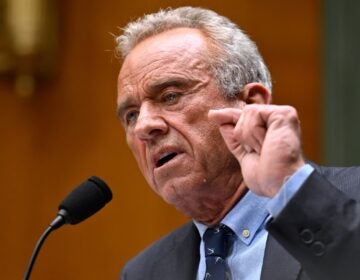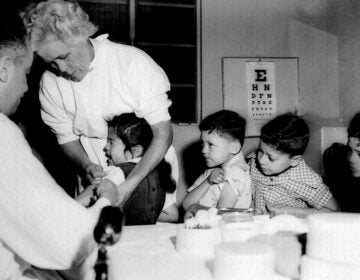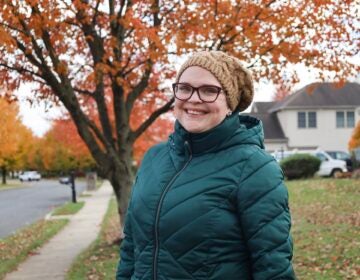Philadelphia health providers say new COVID-19 vaccine eligibility restrictions are confusing patients
The FDA approved updated COVID-19 vaccines for people 65 and older and younger adults and children with underlying medical conditions.
Listen 1:22
File: A pharmacist holds a Pfizer and BioNTech COVID-19 vaccine shot on Thursday, April 24, 2025. (AP Photo/Jenny Kane, File)
From Philly and the Pa. suburbs to South Jersey and Delaware, what would you like WHYY News to cover? Let us know!
Philadelphia-area pediatricians and family medicine providers say new federal policies for COVID-19 vaccines are leaving some of their patients confused about their future eligibility and insurance coverage for the shots.
Federal agencies this week approved updated COVID-19 vaccines ahead of the fall season, but with limited use in adults and children — a departure from past guidance that broadly recommended shots for everyone 6 months and older.
“At this point, everyone who gets a COVID vaccine should have it paid for by their insurance or … covered by things like Medicare and Medicaid,” said Dr. Jennifer Hamilton, a family medicine practitioner. “What that’s going to be like in a month or two, I’m not as sure as I’d like to be.”
On Wednesday, the U.S. Food and Drug Administration approved revised COVID-19 vaccines for seniors 65 and older as well as younger adults and children with at least one underlying condition that increases their risk for severe infection, including asthma, obesity and lung disease.
Health care providers say they’ve been fielding calls from families and patients wondering if they’ll be able to get updated shots this season, especially if they don’t qualify by age or an underlying condition.
Hamilton, who is a fellow at the American Academy of Family Physicians, said that includes at least one of her patients, a woman who is the sole caregiver for her husband with Alzheimer’s disease.
“She’s not listed as the medically vulnerable one, but she needs to stay healthy and she wants to make sure that she can get that COVID vaccine,” she said. “And right now, I don’t have a good answer for her.”
Some health care providers might be willing to give shots to people “off label,” or if they determine that the vaccine is still safe and beneficial, even if a patient doesn’t meet the federally approved conditions.
But people are then more likely to run into health insurance issues, Hamilton said. Some programs and plans only cover vaccines based on federal recommendations.
People who get COVID-19 vaccines otherwise could end up paying as much as $141 per dose, according to Centers for Disease Control and Prevention private sector vaccine prices from last season.
That won’t be an option for many families, Hamilton said.
“Just having them at the doctor’s office doesn’t count if people can’t afford to receive the vaccines,” she said.
New FDA approvals for updated COVID shots
The FDA approval covers Moderna’s mRNA vaccine cleared as safe and effective for anyone 6 months and older and Novavax’s protein-based shot for people 12 years and older.
It also extends to Pfizer’s mRNA vaccine, but the FDA revoked the shot’s emergency authorization status for children 5 and under. Doses will be available for older children and adults who meet the restricted FDA eligibility conditions.
The vaccines have been reformulated to best match coronavirus variants that scientists estimate will be circulating this winter. It’s a similar process to how influenza shots are revised each year.
U.S. Department of Health and Human Services Secretary Robert F. Kennedy Jr. stated in a post on X that the new COVID-19 vaccine recommendations fulfill his promises to “keep vaccines available to people who want them, especially the vulnerable” and “end the emergency.”
But pediatrician Dr. Paul Offit, director of the Vaccine Education Center at Children’s Hospital of Philadelphia, said it’s a false promise.
He pointed to CDC data that showed even healthy children younger than 5, with no underlying conditions, ended up hospitalized with COVID-19 last year.
Out of those, 1 in 5 were admitted to the intensive care unit, Offit said.
“Virtually all were unvaccinated, half were previously healthy and 152 children died” nationally from September 2023 through August 2024, Offit said on WHYY’s “Studio 2.”
“Is that a disease worth preventing? Of course it is. But now you’re about to only have a vaccine for children who are high risk knowing that half of the children who are hospitalized and died were previously healthy,” he said. “So, he does take away vaccines for people who want them.”
Low vaccine uptake
The number of people electing to get COVID-19 vaccines has been historically low.
Slightly over 20% of adults in the U.S. got the latest COVID-19 vaccine during the 2024-2025 season, according to CDC data.
Research from 2022 found that the most common reasons people are hesitant about getting a COVID-19 vaccine are: not trusting the vaccines, concerns about side effects and not trusting government.
For 74-year-old New Jersey native Penny Jardines, she said the immediate short-term side effects she experienced every time she got a COVID shot ultimately became too much to handle.
“Five days of 103 fever, sick as a dog, couldn’t lift my head up off the pillow,” she said. “I just decided, I’m not doing it again.”
The last COVID-19 vaccine Jardines got was in January 2023. Her husband continues to get one every year.
She said she still strongly supports vaccination efforts and access to shots for people who want and need them broadly, and if COVID ever returned to emergency pandemic-era levels again, Jardines said she’d “break down,” get another shot “and know that I was just going to get very sick.”
Access to updated vaccines at pharmacies and clinics
Kim Kelly, a journalist and author in Philadelphia, said she tried getting the current COVID-19 vaccines earlier this week after seeing a Daily Beast story reporting that an advisor to HHS Secretary Kennedy wants to remove the vaccines from the market.
However, she could not schedule vaccine appointments online at pharmacies close to her, including some independent pharmacies, CVS and Walgreens.
“I couldn’t find anywhere that I could easily access where I could go and get this vaccine that I’ve gotten many times before,” Kelly said. “The thing that made it more frightening and sort of nerve-wracking was the fact that there was this news coverage saying that the current guy in charge of … HHS had been making it very clear that he … doesn’t trust these vaccines. He doesn’t want people to be able to get them.”
A CVS spokesperson said that as of Wednesday, when the FDA approved the updated COVID-19 vaccines, last year’s version “was obsolete and was pulled from all clinics and pharmacies.” They are now waiting for a supply of the new updated doses, which they expect to arrive within days.
If someone in Pennsylvania wants a COVID-19 vaccine right now, they cannot get one at these locations.
CVS had previously told WHYY that anyone who wants a shot can still walk into any CVS and get it.
Company officials said they will not broadly offer new COVID shots until another federal committee, the CDC’s Advisory Committee on Immunization Practices, makes final recommendations on who should get the newly formulated vaccines.
ACIP is expected to meet in September, though a formal date has not yet been set and it is unclear if the group will discuss COVID-19 at that time.
There is an exception, a CVS spokesperson said. Local pharmacies can give COVID vaccines to some patients depending on their age if they have a doctor’s prescription.
Public health experts and agencies say people might want to consider getting their COVID-19 shots sooner rather than later, even if the vaccines aren’t the newest updated versions.
In an Aug. 21 health advisory from the Pennsylvania Department of Health, officials described a late-summer uptick in COVID-19 cases and activity and encouraged people to get annual boosters now, especially those at high risk of infection, instead of waiting for the new seasonal doses.
“Ultimately, though, the decision of when to receive a COVID vaccine is up to the individual and their personal care physician,” department spokesperson Mark O’Neill said in an email.
That might be easier said than done, Hamilton said, given that health clinics or pharmacies may be running out of vaccine supply from last year and don’t yet have the new vaccines.
“If you are planning on getting your vaccine at a pharmacy, I would encourage you to call ahead,” she said.
WHYY is your source for fact-based, in-depth journalism and information. As a nonprofit organization, we rely on financial support from readers like you. Please give today.









